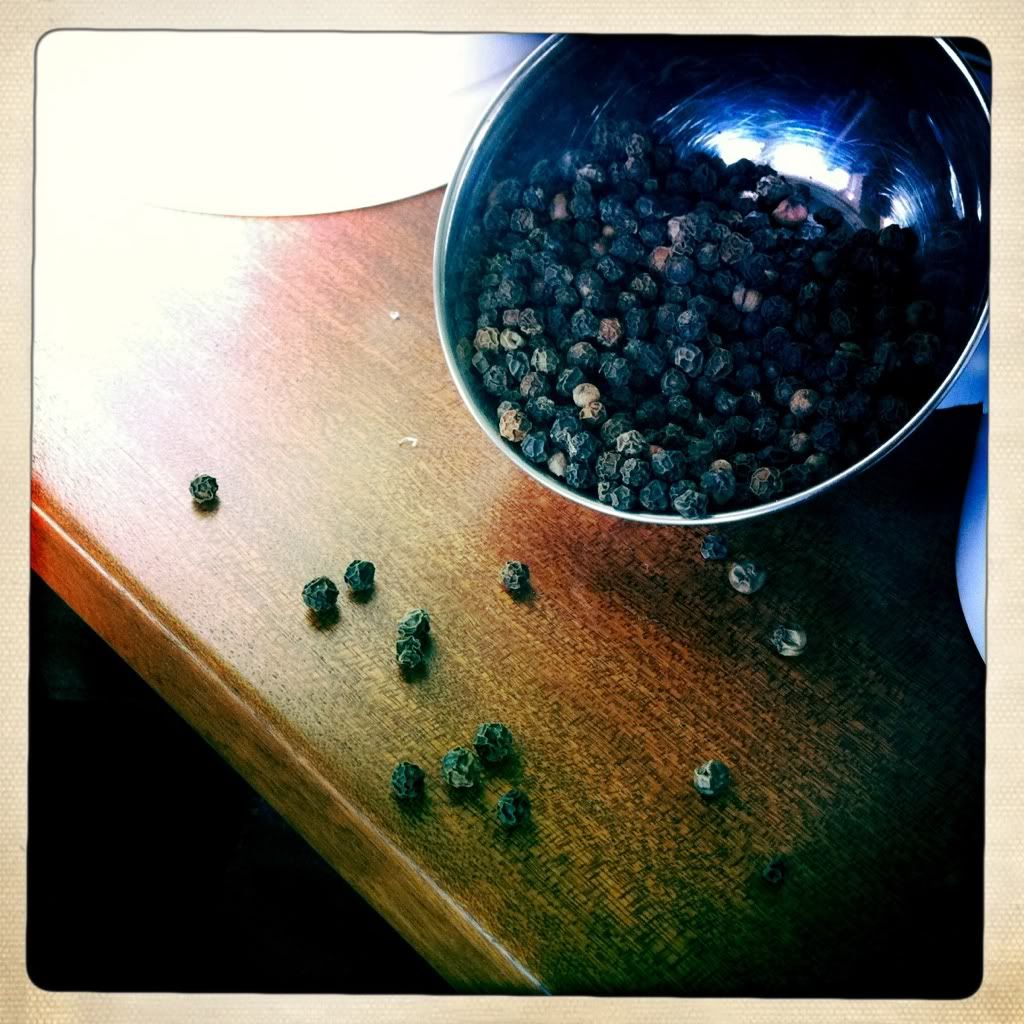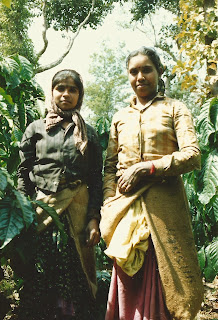Coffee, hold the pepper.
 |
| My father's parents, second from left, c. 1930 |
The estate was basically a forest of eucalyptus trees, under whose canopy grew the coffee bushes. The coffee berries, when wine-red and ripe, hung in clusters against the dark green leaves. The women (mostly women) who worked on the estate would tie burlap sacks around their waists and pick for hours; whenever we went to visit, my dad made my sister and me go out into the bushes with the pickers so that we would know how hard they had to work. The lesson: they worked very hard. Those bags were heavy and chafed my waist when I filled them, and the women would worry over me, expressing concern in a language I couldn't understand. Amazed, I always thought, at how weak I was, how soft, compared to their sinewy strength and stamina.There's a picture of me taken when I was ten or so somewhere in my parents' photo albums; I am smiling, bending down over a heavy branch of ripe coffee berries. The snap was taken, and then I screamed. The women thought I had been bitten by a snake and started shouting. Turns out it was a red ant as big as the first joint on my ten-year-old pinkie. The pickers laughed. They'd seen worse.
When the coffee was brought in, it was laid out on the flat stone terrace in front of my great aunt's house, left to bake in the heat of the sun. This was my favorite part: to dry the coffee, the women would shuffle barefooted through the beans, flipping them with their feet as they moved back and forth. I would always want to jump in, to feel their smoothness, like marbles, as they spilled over my toes; after an hour, though, my feet would suddenly protest, and I would hobble around for the rest of the day, my tender soles no match for the pickers', which were toughened by years going barefoot.
 I haven't been back to the estate since I was in my twenties; it wouldn't be the same. The last time I went, it was without my parents; my cousin-uncle drove me there (his mom was the family matriarch) and when we arrived the workers were all waiting at the gate to greet us. I didn't think anything then of their joy at seeing me, a master's daughter, but later, when my relative took me to see the huts where the workers lived, I was ashamed.
I haven't been back to the estate since I was in my twenties; it wouldn't be the same. The last time I went, it was without my parents; my cousin-uncle drove me there (his mom was the family matriarch) and when we arrived the workers were all waiting at the gate to greet us. I didn't think anything then of their joy at seeing me, a master's daughter, but later, when my relative took me to see the huts where the workers lived, I was ashamed.The only link I have to that place now, since my father sold his share to his cousins, is the peppercorns that I ask for every time my parents visit India; I keep them in my freezer, and when I bring them out I sniff deeply into the ziploc bag. I run my fingers through them like they were precious jewels or coins, and I am greedy for them.
Jungle Curry
The pickers would have made something like this for their families, a simple game curry spiced with pepper and not much else. Serve with rice or rotis, and some chopped raw onion on top. And have lots of milk on hand for emergency mouth relief. The original recipe calls for venison, but goat, beef, or pork would work just as well.
Heat 1/4 cup canola oil in a pot -- a flat-bottomed wok or a deep sauté pan works well -- and when hot add 2 lbs of meat and brown on all sides. Add 1/3 cup (you read that right) coarsely ground black pepper, 1 tsp salt, and the juice of 4 lemons and sauté for a minute or two. Then add 2 c water and let simmer, covered, till the meat is tender. When you get to tender, remove the lid and raise the heat; when most of the liquid evaporates and the oil comes to the top, the curry is done.




Comments
I'm pretty sure I couldn't distinguish between one black pepper and another! Lovely memories.
Thanks, sweets.